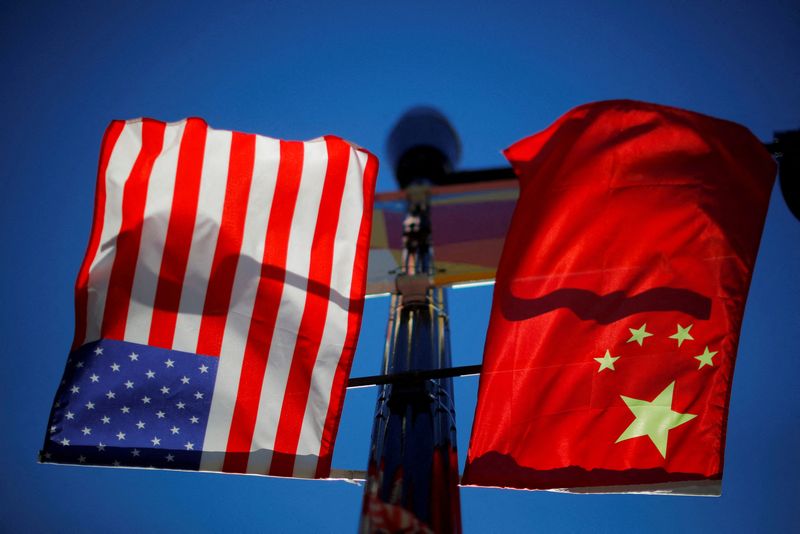By Joe Money
BEIJING (Reuters) -China’s state media have praised some U.S. corporations for “strong collaboration” – commentary that comes amid fears of a commerce conflict and is harking back to how tensions with the U.S. had been lined by Chinese language newspapers throughout Donald Trump’s first presidency.
Trump, who takes workplace on Jan. 20, mentioned on Monday he would impose a ten% tariff on Chinese language items in order that Beijing does extra to stem the circulate of Chinese language-made chemical substances powering an opioid epidemic in america.
He has additionally threatened tariffs in extra of 60% on Chinese language items whereas on the marketing campaign path.
Throughout Trump’s first time period, company executives and international traders scoured Chinese language state media for indicators as to which U.S. corporations may be in favour and which may be penalised as commerce tensions ratcheted up.
The state-owned World Occasions late on Wednesday praised Apple (NASDAQ:), Tesla (NASDAQ:), Starbucks (NASDAQ:) and HP (NYSE:) for sturdy collaboration with Chinese language companions.
“U.S. politicians need to pay attention to and respect the evident willingness of American businesses for economic and trade cooperation by tailoring suitable policy environments for enterprises,” it mentioned.
The China Each day additionally famous that Morgan Stanley (NYSE:) acquired regulatory approval in March to develop its China operations, citing this as proof of international monetary corporations’ enthusiasm for investing in China.
The U.S.-Sino commerce conflict throughout Trump’s first time period noticed China threaten to ban U.S. corporations from importing, exporting and investing in China with the creation of the “Unreliable Entity List”.
On the time, World Occasions reported the record would goal U.S. corporations similar to Apple, Cisco Programs (NASDAQ:) and Qualcomm (NASDAQ:). However China by no means adopted by way of on the menace and thus far the record has solely included U.S. corporations concerned within the sale of arms to Taiwan.
“Neither side was good about communicating policy directly, so business was busy looking at the tea leaves and trying to separate signal and noise in traditional and social media,” mentioned a Beijing-based American government.
The chief, who was additionally in China throughout Trump’s first time period, shouldn’t be authorised to talk to media and declined to be recognized.
Bo Zhengyuan, a Shanghai-based accomplice at consultancy Plenum, mentioned he anticipated Beijing wouldn’t rush to make use of instruments just like the Unreliable Entity Checklist within the speedy wake of any formal tariff announcement as soon as Trump is in energy, given the weak state of the Chinese language financial system.
However Beijing may retaliate later if it felt U.S. policymakers had been harming China’s business pursuits.
“There was collateral damage last time, and there will be collateral damage this time. But I think the Chinese government, given the foreign investment situation here, is mindful that this kind of tactic will have some backlash,” he added.
Throughout Trump’s first time period, Chinese language authorities didn’t typically make direct official feedback on the commerce conflict.

Authorities in mainland China this week have but to make direct touch upon the ten% tariff promised by Trump, though a Chinese language embassy official in Washington has mentioned nobody will win a commerce conflict.
Solely 47% of U.S. corporations had been optimistic about their five-year China enterprise outlook, a September survey by the American Chamber of Commerce in Shanghai confirmed.




